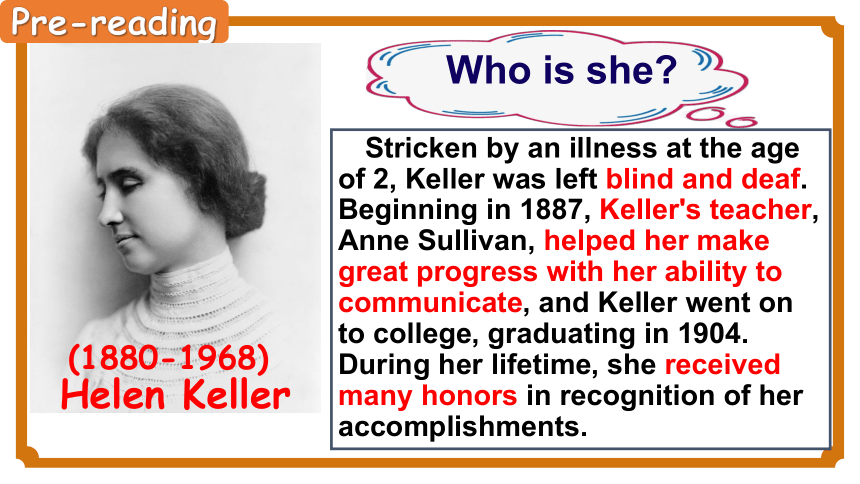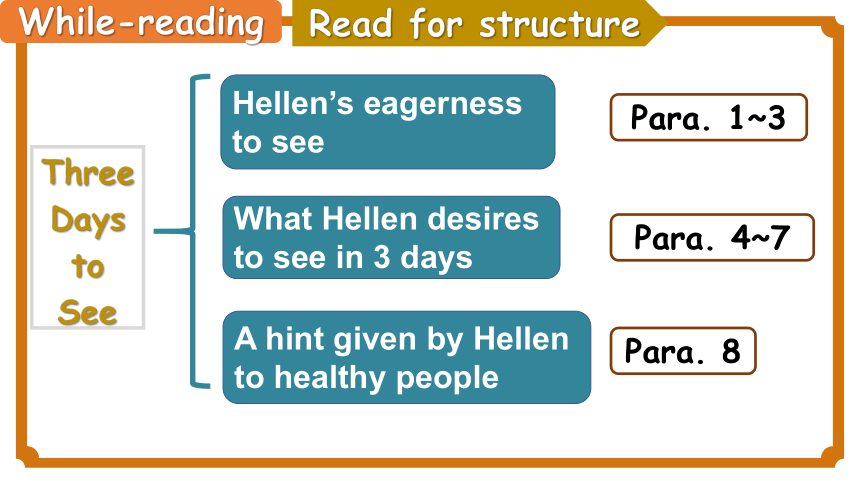外研版(2019) 选择性必修第一册 Unit 2 Onwards and Upwards Developing ideas 课件(16张PPT)
文档属性
| 名称 | 外研版(2019) 选择性必修第一册 Unit 2 Onwards and Upwards Developing ideas 课件(16张PPT) |

|
|
| 格式 | pptx | ||
| 文件大小 | 13.3MB | ||
| 资源类型 | 教案 | ||
| 版本资源 | 外研版(2019) | ||
| 科目 | 英语 | ||
| 更新时间 | 2022-10-20 00:00:00 | ||
图片预览







文档简介
(共16张PPT)
SB1U2
Three Days to See
(Developing ideas)
Lead in
Are there any people live with a disability around you
How many people do you think have a disability
Look at the charts and answer the questions.
Are the numbers different from what you expected In what way
What special assistance can people with disabilities make use of in their daily lives
blind tracks
wheelchair accessible
Guide Dog
Pre-reading
Who is she
Helen Keller
(1880-1968)
Blind
Deaf
American
Famous
author and lecturer
Stricken by an illness at the age of 2, Keller was left blind and deaf. Beginning in 1887, Keller's teacher, Anne Sullivan, helped her make great progress with her ability to communicate, and Keller went on to college, graduating in 1904. During her lifetime, she received many honors in recognition of her accomplishments.
Have you ever read the essay by Helen Keller
What would you do if you have only three days to see
Now let's read the excerpts from Three days to see.
While-reading
Read for structure
Three Days
to See
Hellen’s eagerness to see
A hint given by Hellen to healthy people
Para. 1~3
Para. 4~7
Para. 8
What Hellen desires to see in 3 days
eager to see
The plan of the three days
A hint to those who see
While-reading
Read for details
Read para.2~3 carefully and answer the question.
How did Hellen feel when her friend told her she had observed nothing in particular in the woods
Disappointed B. Appreciative
C. Doubtful D. Approved
How was it possible, I asked myself, to walk for an hour through the woods and see nothing worthy of note I who cannot see find hundreds of things to interest me through mere touch. If I can get so much pleasure from touch, how much more beauty must be revealed by sight And I have imagined what I should most like to see if I were given the use of my eyes, say for just three days.
Read para.4~7 carefully and find out what the author would do if she could see.
On the first day
On the second day
On the third day
She would want to see the kind people who have helped her and accompanied her through life. Then she would like to see the books which have opened her mind. In the afternoon, she would take a long walk in the woods and appreciate the beauty of nature.
She would like to see a display of the progress of civilisation. She would go to the museums and spend the evening at a theater or at the movies.
She would again greet the dawn, anxious to discover new delights, new revelations of beauty. She would spend the third day observing people in their day-to-day life.
Read para.8 carefully and answer the question.
What does the hint given by Hellen suggest
Treasure your senses and make the best of them
Sight is the most delightful sense
Live every day to the full
Make the best of your sight
While-reading
Read beyond lines
Read the sentences from the passage and answer the questions.
What sentence structure is used repeatedly What figure of speech is it
How does this technique help to express the author's emotions
The use of parallelism in speech or writing allows speakers or writers to maintain a consistency within their work and creates a balanced flow of ideas. Moreover, parallelism can be used as a tool for persuasion.
Post-reading
Choose the author's purpose in writing the passage and give your reasons.
To help readers understand what it is like to be blind.
To make readers without disabilities appreciate what they have.
To persuade readers to care about the blind.
Post-reading
Think & Share
What qualities do remarkable people mentioned in this unit convey
Post-reading
Think & Share
What qualities do remarkable people mentioned in this unit convey
perseverance
determination
willpower
hard work
industry
endurance
talent
intelligence
curiosity
SB1U2
Three Days to See
(Developing ideas)
Lead in
Are there any people live with a disability around you
How many people do you think have a disability
Look at the charts and answer the questions.
Are the numbers different from what you expected In what way
What special assistance can people with disabilities make use of in their daily lives
blind tracks
wheelchair accessible
Guide Dog
Pre-reading
Who is she
Helen Keller
(1880-1968)
Blind
Deaf
American
Famous
author and lecturer
Stricken by an illness at the age of 2, Keller was left blind and deaf. Beginning in 1887, Keller's teacher, Anne Sullivan, helped her make great progress with her ability to communicate, and Keller went on to college, graduating in 1904. During her lifetime, she received many honors in recognition of her accomplishments.
Have you ever read the essay by Helen Keller
What would you do if you have only three days to see
Now let's read the excerpts from Three days to see.
While-reading
Read for structure
Three Days
to See
Hellen’s eagerness to see
A hint given by Hellen to healthy people
Para. 1~3
Para. 4~7
Para. 8
What Hellen desires to see in 3 days
eager to see
The plan of the three days
A hint to those who see
While-reading
Read for details
Read para.2~3 carefully and answer the question.
How did Hellen feel when her friend told her she had observed nothing in particular in the woods
Disappointed B. Appreciative
C. Doubtful D. Approved
How was it possible, I asked myself, to walk for an hour through the woods and see nothing worthy of note I who cannot see find hundreds of things to interest me through mere touch. If I can get so much pleasure from touch, how much more beauty must be revealed by sight And I have imagined what I should most like to see if I were given the use of my eyes, say for just three days.
Read para.4~7 carefully and find out what the author would do if she could see.
On the first day
On the second day
On the third day
She would want to see the kind people who have helped her and accompanied her through life. Then she would like to see the books which have opened her mind. In the afternoon, she would take a long walk in the woods and appreciate the beauty of nature.
She would like to see a display of the progress of civilisation. She would go to the museums and spend the evening at a theater or at the movies.
She would again greet the dawn, anxious to discover new delights, new revelations of beauty. She would spend the third day observing people in their day-to-day life.
Read para.8 carefully and answer the question.
What does the hint given by Hellen suggest
Treasure your senses and make the best of them
Sight is the most delightful sense
Live every day to the full
Make the best of your sight
While-reading
Read beyond lines
Read the sentences from the passage and answer the questions.
What sentence structure is used repeatedly What figure of speech is it
How does this technique help to express the author's emotions
The use of parallelism in speech or writing allows speakers or writers to maintain a consistency within their work and creates a balanced flow of ideas. Moreover, parallelism can be used as a tool for persuasion.
Post-reading
Choose the author's purpose in writing the passage and give your reasons.
To help readers understand what it is like to be blind.
To make readers without disabilities appreciate what they have.
To persuade readers to care about the blind.
Post-reading
Think & Share
What qualities do remarkable people mentioned in this unit convey
Post-reading
Think & Share
What qualities do remarkable people mentioned in this unit convey
perseverance
determination
willpower
hard work
industry
endurance
talent
intelligence
curiosity
